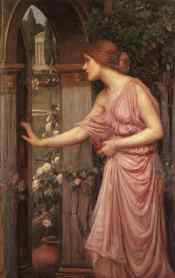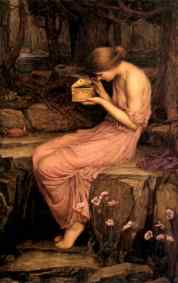

 |
Psyche |
I've included psyche as an archetype rather than as a goddess. If you do a quick refer of Jungian literature you'll find that she is repeated used as a representation of the feminine psyche. Eventually I'll explore more about this and use her as a way of examining the difference between a psychological approach and a magical approach to the world. In the meantime please read her story....
Psyche's inferior sisters had easily found husbands, but Psyche remained unmarried since she was admired by all with the awe that is inspired by divinity. Her father suspected a god's wrath was responsible, and he consulted Apollo. Through the oracle, Cupid commanded the king to set his daughter atop a lonely mountain, decked out like a corpse, where she would be wed to a terrifying serpent. The frightened girl was led away and abandoned by her sorrowing father and friends after conducting the rites of a funeral for a living bride. Resigned to her fate, Psyche fell into a deep sleep, and the gentle breezes of Zephyrus wafter her down into a beautiful valley. When she awoke, she entered a magnificent palace where her every wish was taken care of by invisible hands. She was guided to a bedroom when darkness came, and she lay down fearfully to await what she was sure was an unhappy end to her wonder-filled day. She began to panic when she felt someone beside her,but a man's voice soothed her, and his hands caressed her. Before long she not only was ready, but eager to surrender her virginity. She then fell into a dreamless and untroubled slumber. When she awoke, her wonderful lover was gone.
He was back the next night and the next. Meanwhile, Psyche's sisters set out in search of her; but her mysterious husband continually warned her not to respond to them when they approached. Alone in her prison all day, Psyche begged her husband each night to allow her to see her sisters and give them gold and jewels. He finally consented on the condition that she must not, despite her sisters' urgings, try to learn his identity. When the sisters arrived and interrogated her, Psyche kept her secret -- although she did say that her husband was a very handsome young man.
The sisters returned home with the riches that Psyche had given them, but in their hearts they nursed an all-consuming jealousy. The mysterious bridegroom warned Psyche of her sisters' treachery: their purpose was to persuade her to look upon his face; if she did so, she would never see him again. He also told her that she was pregnant, and if she kept their secret, their child would be divine; if she did not, it would be mortal. Nevertheless, he granted Psyche's wish to see her sisters once again. In answer to their questions, Psyche revealed that she was pregnant. The sisters once again returned home laden with gifts, but more jealous than ever; they now suspected that Psyche's lover must be a god and her expected child divine.
The evil sisters visited Psyche a third time; this time they told her that her not to be a fool, that this passionate lover was hiding some awful truth -- he must really be the monstrous serpent of the oracle in disguise would devour her and her child when the time of her pregnancy completed. Psyche was sufficiently alarmed by this that she forgot the warnings of her husband and took her sisters' advice. She was to hide a sharp knife and a shrouded lamp, and when the monster was asleep, she was to slash it in the night.
When Cupid came to her that same night, he made love as usual, and the lovemaking was better than ever. Psyche was almost discouraged from her intention, but then remembered that the sleeping man could even at that moment be changing into a serpent or worse. She leaned over him with the lamp and found herself looking at a youth of astonishing beauty. Overcome by the sight, her first impulse was to take her own life, but she was unable to. Spellbound by Cupid's beauty, she gazed at his lovely wings and fondled the bow and quiver that lay at the foot of their bed; she pricked her thumb on one of the arrows and drew blood. Overcome by desire, she kissed her husband passionately. Alas, a drop of hot oil fell on his right shoulder, and he awoke. Cupid leapt out of bed and attempted to fly away at once; Psyche caught hold of his right leg and soared aloft with him, but her strength gave out and she fell to earth. Before flying away, Cupid admonished her from a nearby cypress: he had ignored Venus' command, he said, and had taken her as his love; he had warned her; his flight was penalty enough, and her sisters would pay for what they had done.
Psyche was inconsolable. She attempted to commit suicide by throwing herself in a nearby river, but the gentle stream brought her safely to its bank. She was advised by Pan to forget her grief and win back Cupid's love. She wandered about seeking to right the wrong she had done. She prayed at the temples of Hera and other goddesses, all except Venus. Help was not forthcoming, since the other goddesses did not care to offend the one goddess who was capable of wounding immortals as well as mortals.
In her wanderings, she came to the very city where one of her sisters lived. Psyche told her sister what had happened, but added that Cupid would marry the sister if she hastened to his side. The sister called on Zephyrus to carry her from a mountaintop to Cupid's palace, but as she leapt into the air she fell and perished on the rocks below. Psyche then found her way to her other sister, who died in the same manner.
During this time, Cupid lay in his mother's bedroom, moaning because of his burn. Venus, learning of what had happened, rushed to her son's side, berated him for his behavior, and vowed revenge. In a rage, Venus left to pursue Psyche, but eventually abandoned her search. She approached Jupiter, who agreed to send Mercury to make a public proclamation for the capture of Psyche. When she was brought before Venus, the goddess denounced and abused her, imposing upon the poor girl a series of impossible tasks.
First, Psyche was ordered to sort out before nightfall a vast heap of mixed grains (wheat, barley, and the like). In this endeavor, an ant came to her rescue and summed his army to isolate each different grain.
The next day Venus ordered Psyche to go to a riverbank where dangerous sheep with thick golden fleece grazed and to bring back some of their wool. This time, a reed murmured instructions. She did as she was told, and waited until the sheep had stopped their frenzied wandering under the blazing sun, and when they had lain down to rest, she shook from the trees under which they passed the wooly gold clinging to their branches.
Still not satisfied, Venus ordered Psyche to go to the top of a high mountain, from which dark water flowed - water that ultimately fed the Underworld stream of Cocytus - from which Psyche was to bring back a jar filled with its chill water. Among the terrors she had to face was a dragon. This time, she was aided by the eagle of Jupiter, which swooped down and filled the jar for Psyche.
Angrier now than ever, Venus imposed the ultimate task - descent into the realm of Hades. Psyche was ordered to take a box to Proserpina (Persephone) and ask her to send back in it a fragment of her own beauty. In despair Psyche decided to throw herself off a high tower. But the tower spoke to her and gave her specific directions to the Underworld and instructions about what she was and was not to do. Among the stipulations was that she provide herself with sops to mollify Cerberus and money to pay the ferryman Charon. Most important, the tower warned Psyche not to look into the box. Psyche did everything that she had been told, but she could not resist looking into the box. Inside the box was not beauty but the sleep of the dark night of the Underworld, by which she was enveloped.
By now cured of his burn, Cupid flew to Psyche's rescue. He put sleep back into the box and reminded Psyche that her curiosity once again had gotten the better of her. She was to go and complete her task. Cupid then appealed to Jupiter, who agreed to ratify his marriage with Psyche. Since Psyche was made one of the immortals, Venus was appeased. Here is how Apuleius describes the glorious wedding feast on Olympus that marked the happy ending of the story of Cupid and Psyche:
So, with all due ceremony, Psyche was married to Cupid, and in due time, a daughter was born to them, who we call Pleasure (Voluptas).
Since this myth comes from the Roman tradition, I've kept the Roman names for all the gods and goddesses involved. Their Greek names are in parentheses. This tale, to which fairy tales ever since have owed a debt (it is considered to be the first "Cinderella"-type story told), tells us something of ancient attitudes about the nature of woman. Some of these views, both complimentary and unflattering, persist today. For example, among a woman's negative characteristics were shown insatiable curiosity, willingness to gossip and believe the worst, and stubborn insistence on spoiling an enviable situation. On the positive side, she was seen as one willing to admit a mistake and undergo the most humiliating tasks of atonement. It showed her as determined to suffer a descent to hell to keep the affection of the man she loved.
On a deeper allegorical level, Psyche was the embodiment of the triumphant emergence of the soul after its journey through the dark trials of the world. She was represented, after her apotheosis, as winged. Her symbol was a butterfly, itself an example of a glorious metamorphosis. It is curious that in all classical literature this story is the only reference to the butterfly, which is prominent everywhere in the Mediterranean. In Greek folklore the soul was pictured as a butterfly, which is another meaning of the word psyche.
References
Apuleius, Metamorphoses (also known as The Golden Ass) 4.28-6.24.
 |
O latest born and loveliest vision far |
O brightest! though too late for antique vows,
Too, too late for the fond believing lyre,
When holy were the haunted forest boughs,
Holy the air, the water, and the fire;
Yet even in these days so far retir'd
From happy pieties, thy lucent fans,
Fluttering among the faint Olympians,
I see, and sing, by my own eyes inspired.
So let me be thy choir, and make a moan
Upon the midnight hours;
Thy voice, thy lute, thy pipe, thy incense sweet
From swinged censer teeming;
Thy shrine, thy grove, thy oracle, thy heat
Of pale-mouth'd prophet dreaming.
Yes, I will be thy priest, and build a fane
In some untrodden region of my mind,
Where branched thoughts, new grown with pleasant pain,
Instead of pines shall murmur in the wind:
Far, far around shall those dark-cluster'd trees
Fledge the wild-ridged mountains steep by steep;
And there by zephyrs, streams, and birds, and bees,
The moss-lain Dryads shall be lull'd to sleep;
And in the midst of this wide quietness
A rosy sanctuary will I dress
With the wreath'd trellis of a working brain,
With buds, and bells, and stars without a name,
With all the gardener Fancy e'er could feign,
Who breeding flowers, will never breed the same:
And there shall be for thee all soft delight
That shadowy thought can win,
A bright torch, and a casement ope at night,
To let the warm Love in!
Keats, John. 1884. Poetical Works.
